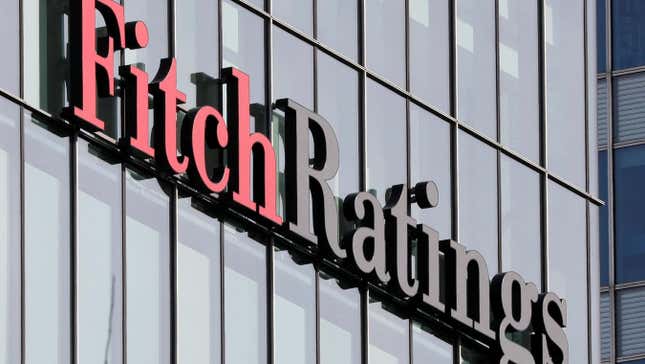
Fitch Ratings downgraded US debt from its pristine AAA rating down to AA+. This won’t affect the US economy much—it’s still the world’s most biggest financial superpower, and the number of investors who want to buy US debt isn’t changing anytime soon.
Debt ratings matter much more to emerging economies than they do to advanced economies. That’s because economies like the US have preferred currencies, the ability to conduct trade with most countries, and the power to establish their own interest rates.
Most economists—including US Treasury Secretary Janet Yellen—aren’t taking the Fitch rating seriously. While “chronic deficits” could be an issue over the next 10 to 20 years, there’s “no immediate crisis of debt sustainability,” said Barry Eichengreen, a UC Berkeley economist who has written a book defending public debt.
“The debt-to-GDP ratio has been heading down, not up,” Eichengreen said. “The debt ceiling has been raised (call me again in 2025). There is no ‘news’ to justify this action.”
For the most part, bond buyers seem uninterested in any credit rating’s assessment of US debt.
“While the US debt downgrade should theoretically cause higher interest rates, as we saw back in 2011, that was not the reality,” wrote analysts from Bespoke Investment Group in a research note. “This morning, yields are pretty subdued with little in the way of changes across the curve, and any moves have been to the downside.”
Other mainstream economists have argued that the debt-to-GDP ratio is a bad tool to begin with. It doesn’t show the actual effect of a country’s debt burden. In November 2020, both Jason Furman and Larry Summers suggested that the interest payments that the US makes on its bonds as a percentage of total GDP would be more predictive of the future fiscal capacity of the US.
Does the debt matter?
Still, some economists prefer that we toss out these measures, since they all trip over the household fallacy, which suggests it’s erroneous to think that a presumably eternal entity like the federal government should need to balance its budget like a person with a finite lifespan might.
“When we’re looking at the government budget position, we should be thinking more about its impact on the economy than anything that has to do with the financial position of the federal government,” JW Mason, an economics professor at John Jay College, told Quartz.
When evaluating the credit-worthiness of the US, the traders and investors in the bond market hold a level of knowledge and expertise that’s much deeper than what Fitch has as a credit rating agency, Mason noted. The analysis also neglects to note that the US Federal Reserve can essentially set the interest rates on US debt.
Reuters reported early on Wednesday that part of what informed Fitch’s analysis was the insurrection at the US capitol on January 6.
“The series of allegations laid out in the latest indictment of former President Trump, while only allegations, do not paint a picture of stable government, but the counterargument is that the American government’s refusal to back its outgoing executive’s effort to overthrow election results is evidence of why a high credit rating is justified,” Bespoke analysts wrote in another research note. “Either way, as a fiat currency issuer, the US government will always be able to pay its debt; the question is its willingness to do so.”